Poems of Anne Brontë, 1838-41
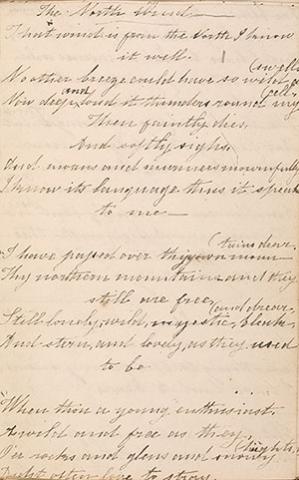
When she was in her early twenties, Anne Brontë (1820–1849) made this neat, 26-page handwritten transcription of nine poems she had composed from 1838 (beginning the week after her eighteenth birthday) through the summer of 1841. She wrote many of the poems at her family’s home, the parsonage in Haworth, West Yorkshire, in the north of England, and several while she was away working as a governess.
Brontë’s first drafts of these texts do not survive. After she had composed the poems, she recopied them into a notebook, noting the date of completion at the end of each manuscript poem and signing all but one with her full name or initials. About a half-century after Anne’s death, by which time Brontë manuscripts had become desirable to collectors, the sheets were rebound by the London firm Riviere & Son in ornately gold-tooled red leather, turning what was presumably a simple copybook into a luxury object. The sheets were trimmed very close to Brontë’s handwritten text, cutting off one word of the poem “The North Wind.” If there were any notes on the original endpapers, they were not retained.
Brontë wrote some of the poems in the voices of fictional characters of Gondal, an imaginary world she and her sister Emily had created together as children. Into their twenties, Anne and Emily continued to enjoy spinning narratives of Gondal and sometimes employed the minuscule handwriting they and their siblings Charlotte and Branwell had developed for their juvenile writings. See, for example, the end of the manuscript of “The Captive’s Dream,” where Brontë has written the “signature” of the Gondal character Alexandrina Zenobia in cursive as well as a line count, her own signature, and the date in a minute hand that resembles printed type.
Of the nine compositions included in this notebook, Brontë selected only the final one for inclusion in Poems by Currer, Ellis, and Acton Bell (London: Aylott & Jones), the book that she and her sisters Charlotte and Emily published pseudonymously in 1846. The poem, entitled “A Fragment” in the manuscript, was retitled “Self-Congratulation” for publication and its explicit Gondal references stripped away. The other eight poems in this notebook remained unpublished until fifty-three years after Brontë’s death, when they appeared in Poems by Charlotte, Emily and Anne Brontë (New York: Dodd, Mead & Co., 1902).
This manuscript was acquired by Henry Houston Bonnell (1859–1926), an ambitious American collector from Philadelphia. Bonnell bequeathed his collection to the Brontë Society, which administers the Brontë Parsonage Museum, and also provided for his widow, Helen Safford Bonnell, to retain items of her choice. During the 1960s, she began to donate those manuscripts, letters, and documents she had retained to the Morgan Library; the balance of the Bonnell collection came to the Morgan in her 1969 bequest.
Note on the text
A transcription of each page of Brontë’s manuscript text, including cancelled words, is provided. Her original spelling and capitalization are retained. An effort has been made to transcribe her punctuation marks, though many are ambiguous, and some end-of-line marks may have been cut off when her original notebook was taken apart and rebound over a century ago.
The texts of all the poems appear in Edward Chitham’s edition The Poems of Anne Brontë: A New Text and Commentary (London: Macmillan, 1979), poems 4–10 and 15–16. The Gondal poems are also published in The Brontës: Tales of Glass Town, Angria, and Gondal. Selected Writings, ed. Christine Alexander (Oxford University Press, 2010), pp. 454–65.
Introduction, notes, and manuscript transcriptions by Christine Nelson, Drue Heinz Curator of Literary and Historical Manuscripts, with contributions by Brooke Krancer, RealArts@Penn intern, 2019. We acknowledge with gratitude the work of scholars Edward Chitham and Christine Alexander.
Anne Brontë, 1820-1849
Collection of poems : autograph manuscript signed : [Haworth], 1838 Jan. 24-1841 Aug. 19
The Henry Houston Bonnell Brontë Collection. Bequest of Helen Safford Bonnell, 1969
MA 2696.5
Thumbnails
"The North Wind", p. 1
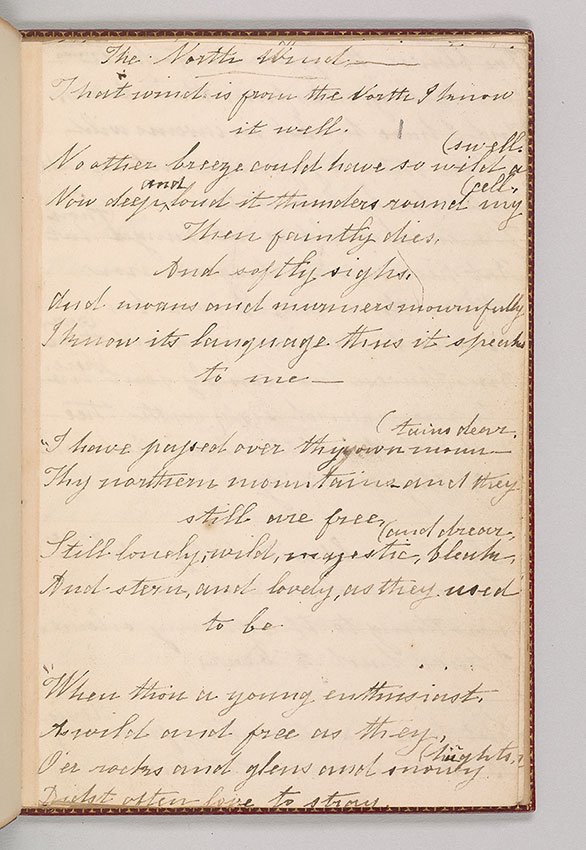
Collection of poems : autograph manuscript signed : [Haworth]
The Henry Houston Bonnell Brontë Collection. Bequest of Helen Safford Bonnell, 1969
“The North Wind” (pp. 1–3)
Composed 26 January 1838, a few days after Brontë’s eighteenth birthday. Written in the voice of Alexandrina Zenobia, a character in the Gondal saga. First published in Poems (1902), pp. 187–88. Poem 5 in Chitham (1979); pp. 455–57 in Alexander (2010).
The North Wind —
––––––––
That wind is from the North I know it well.
No other breeze could have so wild a swell.
Now deep and loud it thunders round my cell,
Then faintly dies,
And softly sighs,
And moans and murmers mournfully
I know its language thus it speaks to me —
“I have passed over thy own mountains dear,
Thy northern mountains – and they still are free,
Still lonely, wild, majestic, bleak, and drear,
And stern, and lovely, as they used to be
“When thou a young enthusiast,
As wild and free as they,
O’er rocks and glens and snowy heights
Didst often love to stray.
| Attachment | Size |
|---|---|
| 20.04 MB |
"The North Wind", p. 2
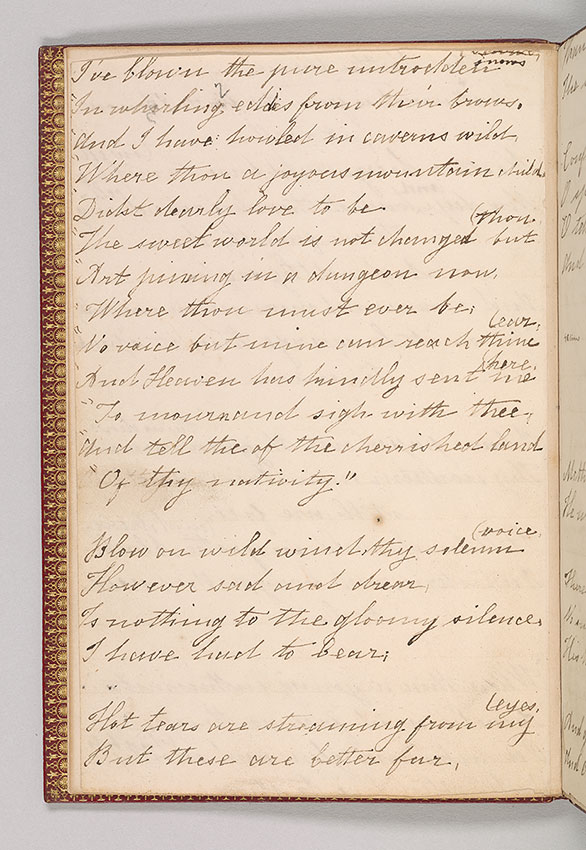
Collection of poems : autograph manuscript signed : [Haworth]
The Henry Houston Bonnell Brontë Collection. Bequest of Helen Safford Bonnell, 1969
“The North Wind” (pp. 1–3)
Composed 26 January 1838, a few days after Brontë’s eighteenth birthday. Written in the voice of Alexandrina Zenobia, a character in the Gondal saga. First published in Poems (1902), pp. 187–88. Poem 5 in Chitham (1979); pp. 455–57 in Alexander (2010).
“I’ve blown the pure* untrodden snows
In whirling eddies from their brows,
And I have howled in caverns wild,
Where thou a joyous mountain child
Didst dearly love to be.
The sweet world is not changed but thou
Art pining in a dungeon now,
Where thou must ever be;
No voice but mine can reach thine ear
And Heaven has kindly sent me here,
To mourn and sigh with thee,
And tell the[e] of the cherrished land
Of thy nativity.”
Blow on wild wind, thy solemn voice,
However sad and drear,
Is nothing to the gloomy silence
I have had to bear;
Hot tears are streaming from my eyes,
But these are better far,
*Note: Chitham (1979) transcribes the starred word as “wild,” but the manuscript reads “pure.”
| Attachment | Size |
|---|---|
| 20.04 MB |
"The Captive’s Dream", p. 3
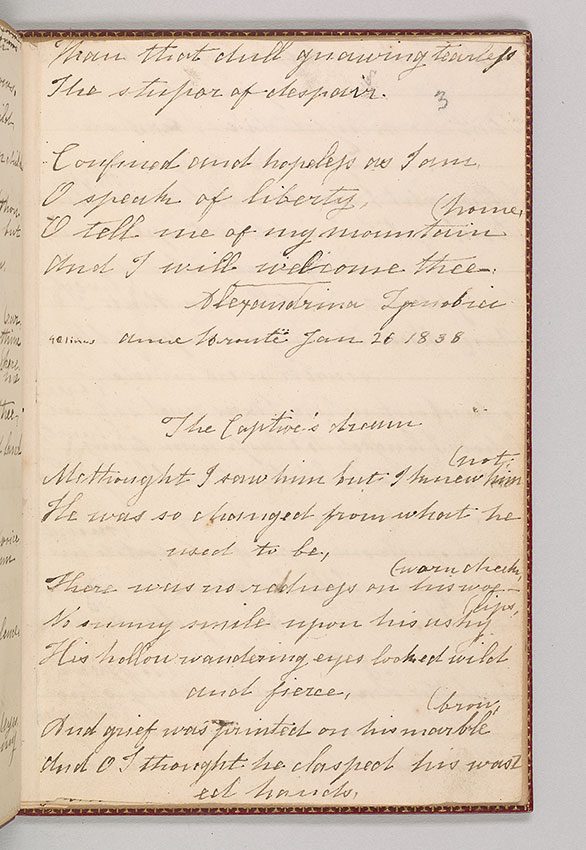
Collection of poems : autograph manuscript signed : [Haworth]
The Henry Houston Bonnell Brontë Collection. Bequest of Helen Safford Bonnell, 1969
“The North Wind” (pp. 1–3)
Composed 26 January 1838, a few days after Brontë’s eighteenth birthday. Written in the voice of Alexandrina Zenobia, a character in the Gondal saga. First published in Poems (1902), pp. 187–88. Poem 5 in Chitham (1979); pp. 455–57 in Alexander (2010).
“The Captive’s Dream” (pp. 3–5)
Composed 24 January 1838, a few days after Brontë’s eighteenth birthday. Written in the voice of Alexandrina Zenobia. First published in Poems (1902), pp. 185–86. Published in The Complete Poems of Anne Brontë (London: Hodder & Stoughton, 1920) with the incorrect title “A Captain’s Dream.” Poem 4 in Chitham (1979); pp. 454–55 in Alexander (2010).
Than that dull gnawing tearless [time]*
The stupor of despair.
Confined and hopeless as I am,
O speak of liberty,
O tell me of my mountain home,
And I will welcome thee.
––––––––
Alexandrina Zenobia
40 lines Anne Brontë Jan 26 1838
The Captive’s dream
Methought I saw him but I knew him not;
He was so changed from what he used to be,
There was no redness on his woe-worn cheek,
No sunny smile upon his ashy lips,
His hollow wandering eyes looked wild and fierce,
And grief was printed on his marble brow,
And O I thought he clasped his wasted hands,
*Note: The final word of the starred line, which Brontë would have written just above, was trimmed off when Brontë’s original notebook was cut apart. Thomas Wise, who had access to the manuscript before binding, supplied the word “time” in a transcription he made of the text. It is not clear whether Wise knew that to be the missing word or whether he simply chose a word he thought would make sense.
| Attachment | Size |
|---|---|
| 20.04 MB |
"The Captive’s Dream", p. 4
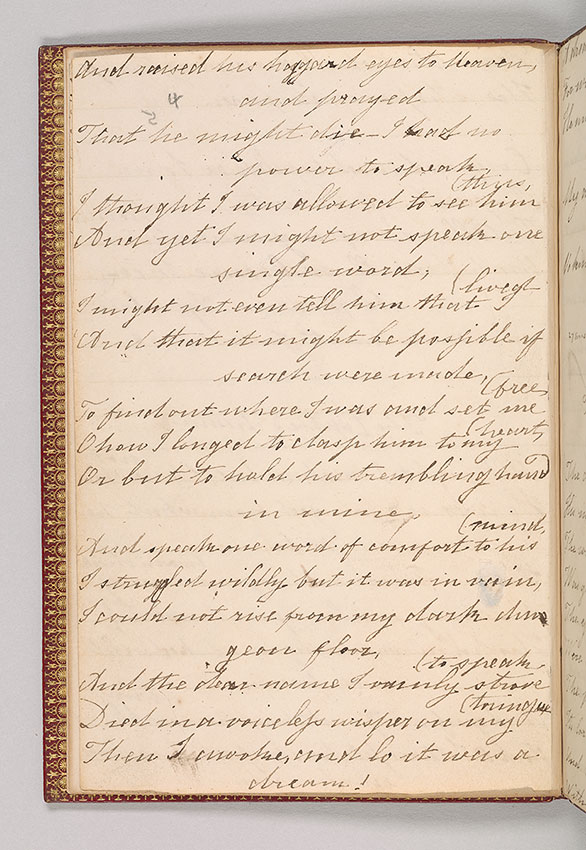
Collection of poems : autograph manuscript signed : [Haworth]
The Henry Houston Bonnell Brontë Collection. Bequest of Helen Safford Bonnell, 1969
“The Captive’s Dream” (pp. 3–5)
Composed 24 January 1838, a few days after Brontë’s eighteenth birthday. Written in the voice of Alexandrina Zenobia. First published in Poems (1902), pp. 185–86. Published in The Complete Poems of Anne Brontë (London: Hodder & Stoughton, 1920) with the incorrect title “A Captain’s Dream.” Poem 4 in Chitham (1979); pp. 454–55 in Alexander (2010).
And raised his haggard eyes to Heaven, and prayed
That he might die – I had no power to speak,
I thought I was allowed to see him thus,
And yet I might not speak one single word;
I might not even tell him that I lived
And that it might be possible if search were made,
To find out where I was and set me free,
O how I longed to clasp him to my heart,
Or but to hold his trembling hand in mine,
And speak one word of comfort to his mind,
I struggled wildly but it was in vain,
I could not rise from my dark dungeon floor,
And the dear name I vainly strove to speak,
Died in a voiceless whisper on my tongue
Then I awoke, and lo it was a dream!
| Attachment | Size |
|---|---|
| 20.04 MB |
"The Parting", p. 5
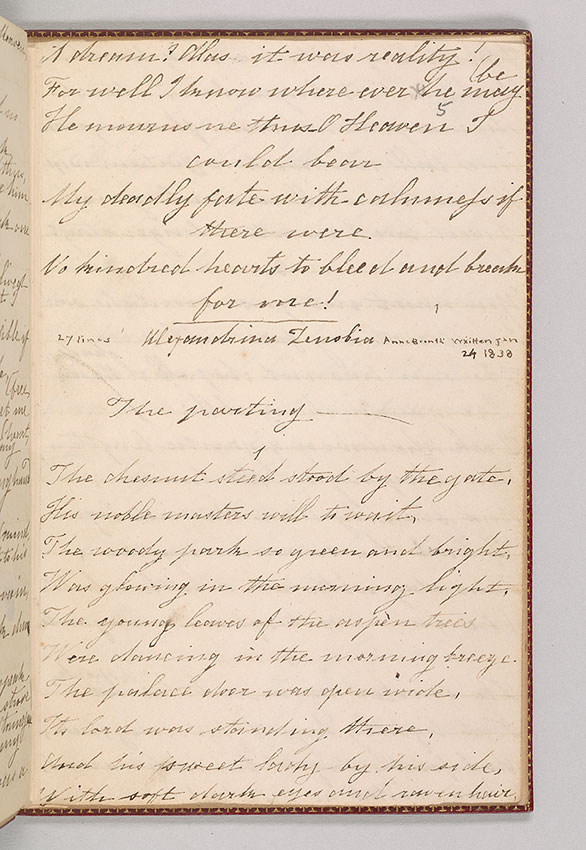
Collection of poems : autograph manuscript signed : [Haworth]
The Henry Houston Bonnell Brontë Collection. Bequest of Helen Safford Bonnell, 1969
“The Captive’s Dream” (pp. 3–5)
Composed 24 January 1838, a few days after Brontë’s eighteenth birthday. Written in the voice of Alexandrina Zenobia. First published in Poems (1902), pp. 185–86. Published in The Complete Poems of Anne Brontë (London: Hodder & Stoughton, 1920) with the incorrect title “A Captain’s Dream.” Poem 4 in Chitham (1979); pp. 454–55 in Alexander (2010).
“The Parting” (pp. 5–8)
Composed 9 July 1838, when Brontë was eighteen. Written in the voice of Alexandrina Zenobia. First published in Poems (1902), pp. 189–91. Poem 6 in Chitham (1979); pp. 457–59 in Alexander (2010).
A dream? Alas it was reality!
For well I know where ever he may be
He mourns me thus – O Heaven I could bear
My deadly fate with calmness if there were
No kindred hearts to bleed and break for me!
––––––––
Alexandrina Zenobia
27 lines Anne Brontë written Jan 24 1838
The parting —
1
The chesnut steed stood by the gate,
His noble master[’]s will to wait,
The woody park so green and bright,
Was glowing in the morning light,
The young leaves of the aspen trees
Were dancing in the morning breeze.
The palace door was open wide,
Its lord was standing there,
And his sweet lady by his side,
With soft dark eyes and raven hair,
| Attachment | Size |
|---|---|
| 20.04 MB |
"The Parting", p. 6
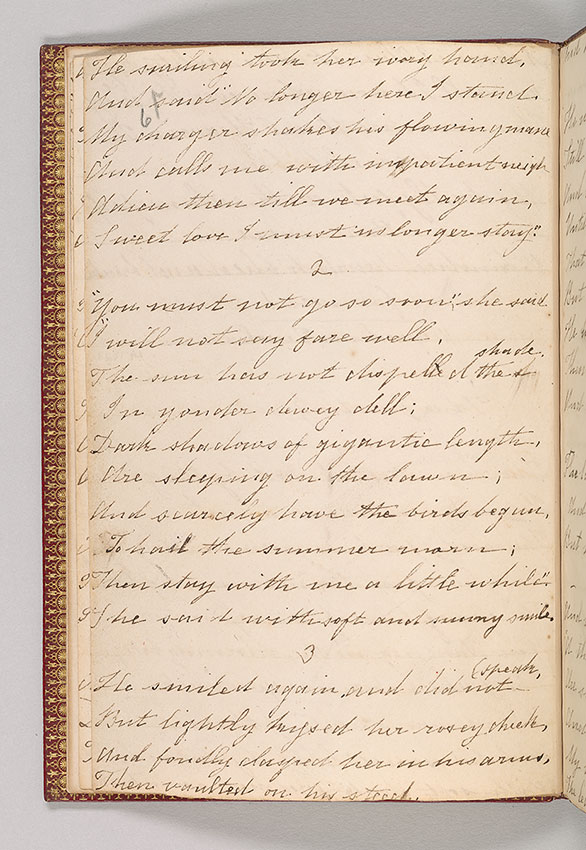
Collection of poems : autograph manuscript signed : [Haworth]
The Henry Houston Bonnell Brontë Collection. Bequest of Helen Safford Bonnell, 1969
“The Parting” (pp. 5–8)
Composed 9 July 1838, when Brontë was eighteen. Written in the voice of Alexandrina Zenobia. First published in Poems (1902), pp. 189–91. Poem 6 in Chitham (1979); pp. 457–59 in Alexander (2010).
He smiling took her wary hand,
And said “No longer here I stand.
My charger shakes his flowing mane
And calls me with impatient neigh
Adieu then till we meet again,
Sweet love I must no longer stay.”
2
“You must not go so soon,” she said
“I will not say fare well,
The sun has not dispelled the shade
In yonder dewey dell;
Dark shadows of gigantic length,
Are sleeping on the lawn;
And scarcely have the birds begun,
To hail the summer morn;
Then stay with me a little while.”
She said with soft and sunny smile.
3
He smiled again, and did not speak,
But lightly kissed her rosey cheek,
And fondly clasped her in his arms,
Then vaulted on his steed.
| Attachment | Size |
|---|---|
| 20.04 MB |
"The Parting", p. 7
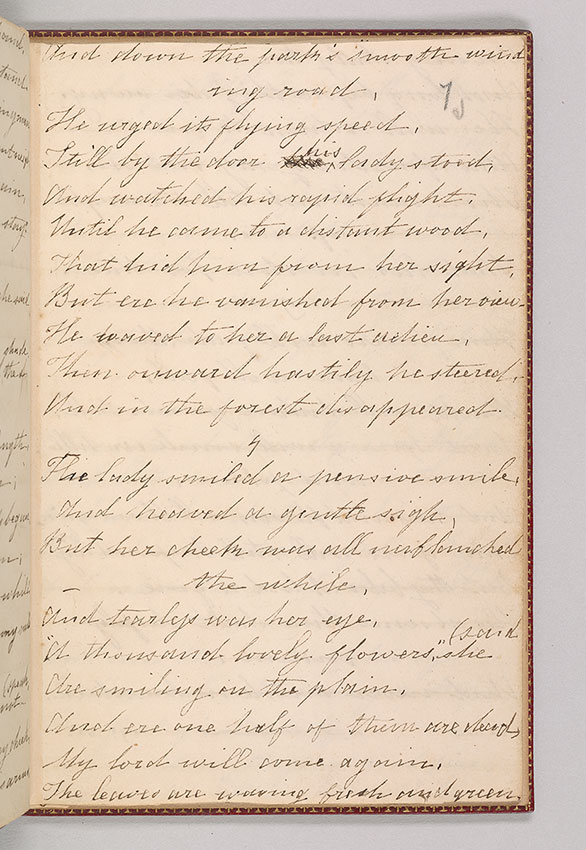
Collection of poems : autograph manuscript signed : [Haworth]
The Henry Houston Bonnell Brontë Collection. Bequest of Helen Safford Bonnell, 1969
“The Parting” (pp. 5–8)
Composed 9 July 1838, when Brontë was eighteen. Written in the voice of Alexandrina Zenobia. First published in Poems (1902), pp. 189–91. Poem 6 in Chitham (1979); pp. 457–59 in Alexander (2010).
And down the park’s smooth winding road,
He urged its flying speed,
Still by the door the his lady stood,
And watched his rapid flight,
Until he came to a distant wood,
That hid him from her sight,
But ere he vanished from her view,
He waved to her a last adieu,
Then onward hastily he steered,
And in the forest disappeared.
4
His The lady smiled a pensive smile,
And heaved a gentle sigh,
But her cheek was all unblanched the while,
And tearless was her eye,
“A thousand lovely flowers,” she said
Are smiling on the plain,
And ere one half of them are dead,
My lord will come again,
The leaves are waving fresh and green,
| Attachment | Size |
|---|---|
| 20.04 MB |
"The Parting", p. 8
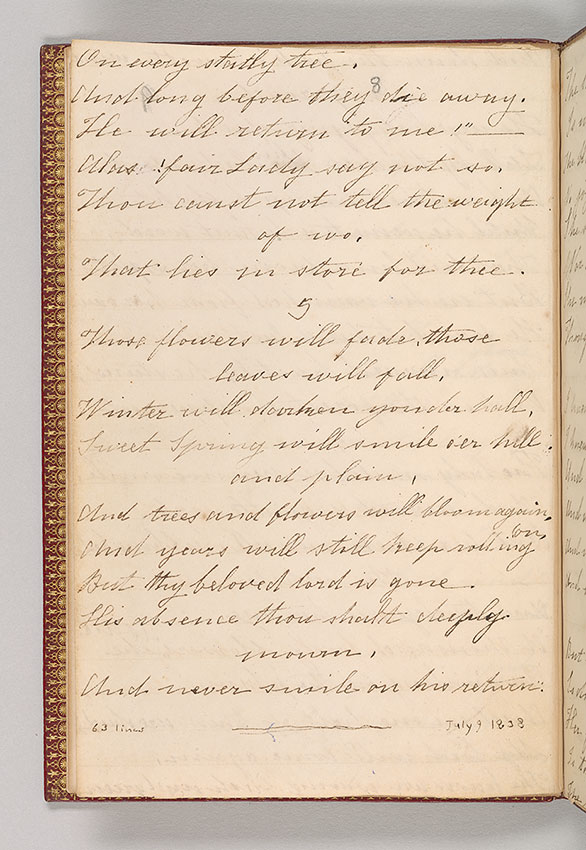
Collection of poems : autograph manuscript signed : [Haworth]
The Henry Houston Bonnell Brontë Collection. Bequest of Helen Safford Bonnell, 1969
“The Parting” (pp. 5–8)
Composed 9 July 1838, when Brontë was eighteen. Written in the voice of Alexandrina Zenobia. First published in Poems (1902), pp. 189–91. Poem 6 in Chitham (1979); pp. 457–59 in Alexander (2010).
On every stat[e]ly tree,
And long before they die away,
He will return to me!” —
Alas! Fair Lady say not so,
Thou canst not tell the weight of wo,
That lies in store for thee.
5
Those flowers will fade, those leaves will fall,
Winter will darken yonder hall,
Sweet Spring will smile o’er hill and plain,
And trees and flowers will bloom again,
And years will still keep rolling on,
But thy beloved lord is gone.
His absence thou shalt deeply mourn,
And never smile on his return.
63 lines –––––––– July 9 1838
| Attachment | Size |
|---|---|
| 20.04 MB |
["The lady of Alzerno’s hall"], p. 9
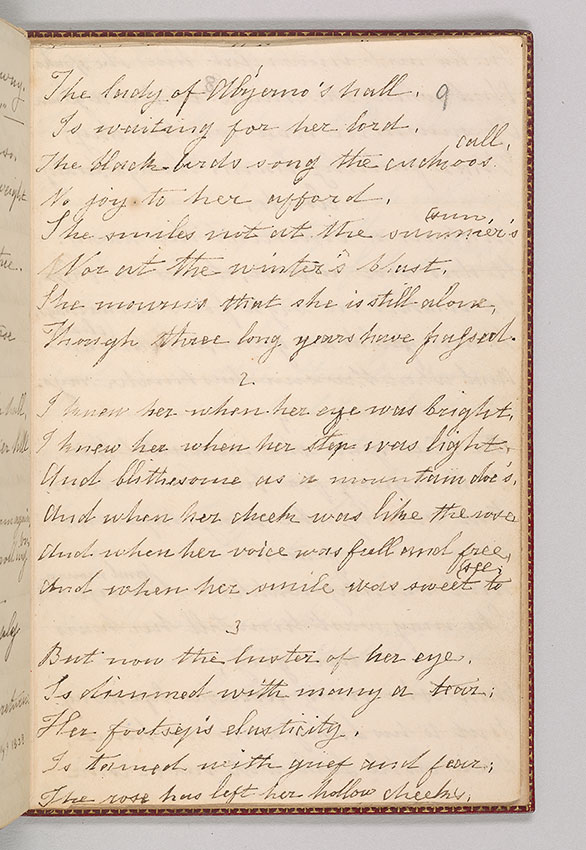
Collection of poems : autograph manuscript signed : [Haworth]
The Henry Houston Bonnell Brontë Collection. Bequest of Helen Safford Bonnell, 1969
[“The lady of Alzerno’s hall”] (pp. 9–12)
This untitled poem was presumably intended as the second part of the previous poem, “The Parting.” Brontë noted two dates at the end: the first, 1837, is the fictional date of composition by Alexandrina Zenobia; the second, 10 July 1838, is Brontë’s own date of composition (the day after she completed “The Parting”). First published in Poems (1902), pp. 192–94, with the incorrect title “The Lady of Abyerno’s Hall.” Published in The Complete Poems of Anne Brontë (London: Hodder & Stoughton, 1920) with the title “The Parting,” part II. Poem 7 in Chitham (1979); pp. 459–61 in Alexander (2010).
1
The lady of Alzerno’s hall,
Is waiting for her lord,
The black-bird[’]s song the cuckoo[’]s call,
No joy to her afford,
She smiles not at the summer’s sun,
Nor at the winter’s blast,
She mourns that she is still alone,
Though three long years have passed.
2
I knew her when her eye was bright,
I knew her when her step was light,
And blithesome as a mountain doe’s,
And when her cheek was like the rose,
And when her voice was full and free,
And when her smile was sweet to see,
3
But now the luster of her eye,
Is* dimmed with many a tear;
Her footstep’s elasticity,
Is tamed with grief and fear;
The rose has left her hollow cheeks;
*Note: Chitham (1979) transcribes the starred word as “So,” but the manuscript reads “Is.”
| Attachment | Size |
|---|---|
| 20.04 MB |
["The lady of Alzerno’s hall"], p. 10
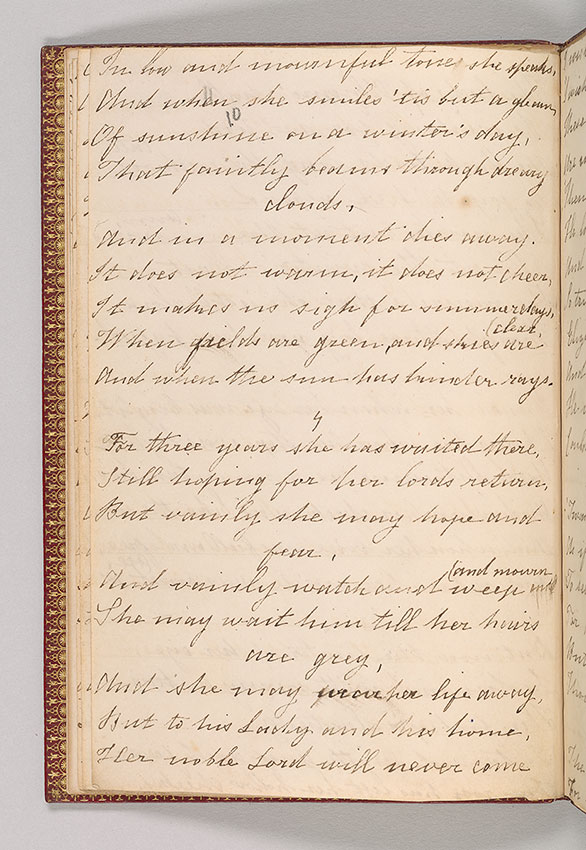
Collection of poems : autograph manuscript signed : [Haworth]
The Henry Houston Bonnell Brontë Collection. Bequest of Helen Safford Bonnell, 1969
[“The lady of Alzerno’s hall”] (pp. 9–12)
This untitled poem was presumably intended as the second part of the previous poem, “The Parting.” Brontë noted two dates at the end: the first, 1837, is the fictional date of composition by Alexandrina Zenobia; the second, 10 July 1838, is Brontë’s own date of composition (the day after she completed “The Parting”). First published in Poems (1902), pp. 192–94, with the incorrect title “The Lady of Abyerno’s Hall.” Published in The Complete Poems of Anne Brontë (London: Hodder & Stoughton, 1920) with the title “The Parting,” part II. Poem 7 in Chitham (1979); pp. 459–61 in Alexander (2010).
In low and mournful tones she speaks,
And when she smiles ’tis but a gleam,
Of sunshine on a winter’s day,
That faintly beams through dreary clouds,
And in a moment dies away.
It does not warm, it does not cheer,
It makes us sigh for summer days,
When fields are green, and skies are clear,
And when the sun has kinder rays.
4
For three years she waited there,
Still hoping for her lord[’]s return,
But vainly she may hope and fear,
And vainly watch and weep and mourn,
She may wait him till her hairs are grey,
And she may pine wear her life away,
But to his Lady and his home,
Her noble lord will never come
| Attachment | Size |
|---|---|
| 20.04 MB |
["The lady of Alzerno’s hall"], p. 11
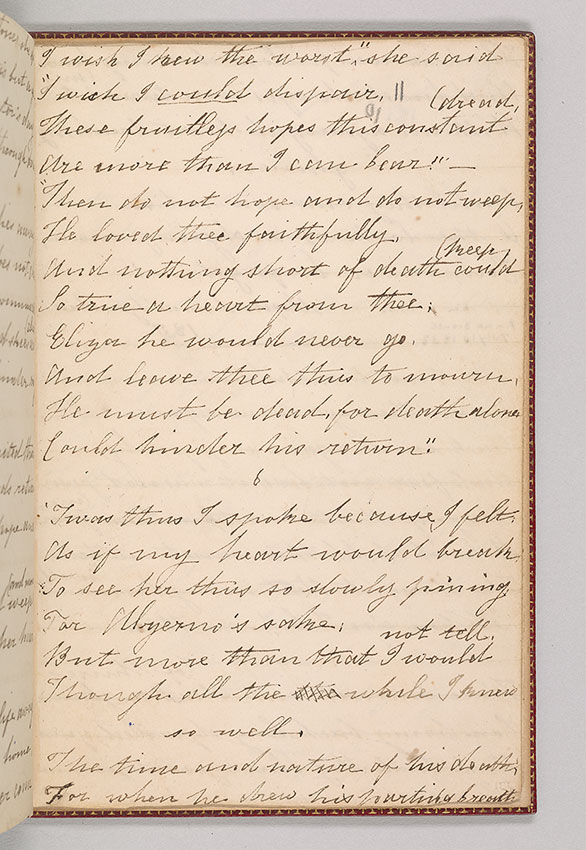
Collection of poems : autograph manuscript signed : [Haworth]
The Henry Houston Bonnell Brontë Collection. Bequest of Helen Safford Bonnell, 1969
[“The lady of Alzerno’s hall”] (pp. 9–12)
This untitled poem was presumably intended as the second part of the previous poem, “The Parting.” Brontë noted two dates at the end: the first, 1837, is the fictional date of composition by Alexandrina Zenobia; the second, 10 July 1838, is Brontë’s own date of composition (the day after she completed “The Parting”). First published in Poems (1902), pp. 192–94, with the incorrect title “The Lady of Abyerno’s Hall.” Published in The Complete Poems of Anne Brontë (London: Hodder & Stoughton, 1920) with the title “The Parting,” part II. Poem 7 in Chitham (1979); pp. 459–61 in Alexander (2010).
“I wish I knew the worst,” she said
“I wish I could dispair,
These fruitless hopes this constant dread,
Are more than I can bear!” —
“Then do not hope and do not weep,
He loved thee faithfully,
And nothing short of death could keep
So true a heart from thee;
Eliza he would never go,
And leave thee thus to mourn,
He must be dead, for death alone
Could hinder his return.”
6
’Twas thus I spoke because I felt,
As if my heart would break,
To see her thus so slowly pining
For Alzerno’s sake;
But more than that I would not tell,
Though all the the while I knew so well,
The time and nature of his death;
For when he drew his parting breath
| Attachment | Size |
|---|---|
| 20.04 MB |
"Verses to a Child", p. 12
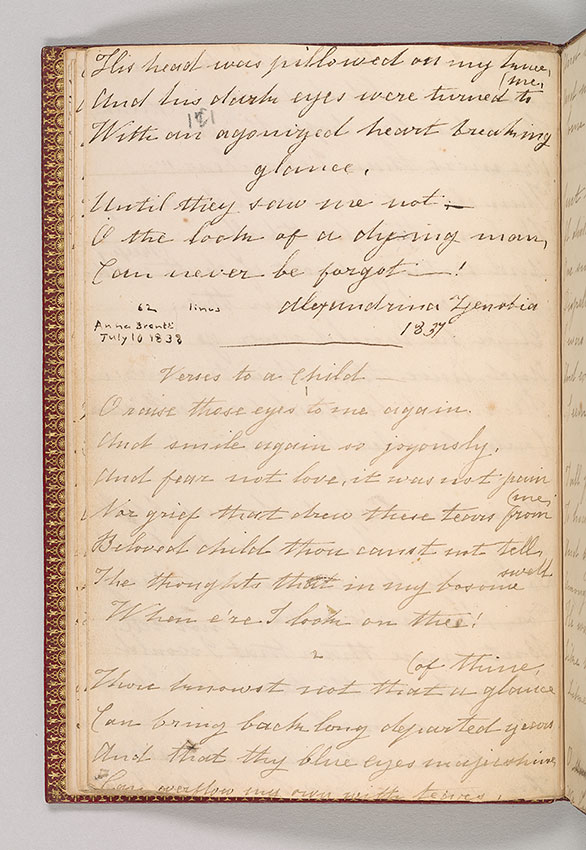
Collection of poems : autograph manuscript signed : [Haworth]
The Henry Houston Bonnell Brontë Collection. Bequest of Helen Safford Bonnell, 1969
[“The lady of Alzerno’s hall”] (pp. 9–12)
This untitled poem was presumably intended as the second part of the previous poem, “The Parting.” Brontë noted two dates at the end: the first, 1837, is the fictional date of composition by Alexandrina Zenobia; the second, 10 July 1838, is Brontë’s own date of composition (the day after she completed “The Parting”). First published in Poems (1902), pp. 192–94, with the incorrect title “The Lady of Abyerno’s Hall.” Published in The Complete Poems of Anne Brontë (London: Hodder & Stoughton, 1920) with the title “The Parting,” part II. Poem 7 in Chitham (1979); pp. 459–61 in Alexander (2010).
“Verses to a Child” (pp. 12–15)
Composed 21 August 1838, when Brontë was eighteen. Written in the voice of Alexandrina Zenobia. First published in Poems (1902), pp. 195–97. Poem 8 in Chitham (1979); pp. 461–63 in Alexander (2010).
His head was pillowed on my knee,
And his dark eyes were turned to me,
With an agonized heart breaking glance,
Until they saw me not —
O the look of a dying man,
Can never be forgot —!
Alexandrina Zenobia
1837
62 lines
Anne Brontë
July 10 1838
––––––––––––
Verses to a Child
1
O raise those eyes to me again.
And smile again so joyously,
And fear not love, it was not pain
Nor grief that drew these tears from me;
Beloved child thou canst not tell,
The thoughts that in my bosome swell*
When e’re I look on thee!
2
Thou knowst not that a glance of thine,
Can bring back long departed years
And that thy blue eyes[’] magic shine,
Can overflow my own with tears,
*Note: Chitham (1979) transcribes the starred word as “dwell,” but the manuscript reads “swell.”
| Attachment | Size |
|---|---|
| 20.04 MB |
"Verses to a Child", p. 13

Collection of poems : autograph manuscript signed : [Haworth]
The Henry Houston Bonnell Brontë Collection. Bequest of Helen Safford Bonnell, 1969
“Verses to a Child” (pp. 12–15)
Composed 21 August 1838, when Brontë was eighteen. Written in the voice of Alexandrina Zenobia. First published in Poems (1902), pp. 195–97. Poem 8 in Chitham (1979); pp. 461–63 in Alexander (2010).
And that each feature soft and fair
And every curl of golden hair,
Some sweet remembrance bears.
3
Just then thou didst recall to me
A distant long forgotten scene;
One smile and one sweet word from thee
Dispelled the years that rolled between,
I was a little child again,
And every after joy and pain,
Seemed never to have been.
4
Tall forest trees waved over me,
To hide me from the heat of day,
And by my side a child like thee,
Among the summer flowerets lay.
He was thy sire: thou merry child.
Like thee he spoke, like thee he, smiled
Like thee he used to play,
5
O Mary those were calm and happy days,
We loved each other fondly then
| Attachment | Size |
|---|---|
| 20.04 MB |
"Verses to a Child", p. 14
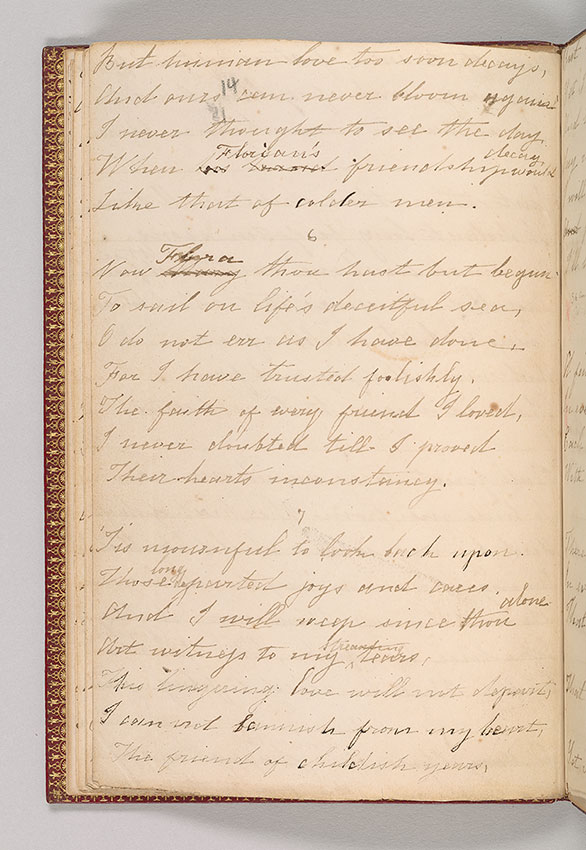
Collection of poems : autograph manuscript signed : [Haworth]
The Henry Houston Bonnell Brontë Collection. Bequest of Helen Safford Bonnell, 1969
“Verses to a Child” (pp. 12–15)
Composed 21 August 1838, when Brontë was eighteen. Written in the voice of Alexandrina Zenobia. First published in Poems (1902), pp. 195–97. Poem 8 in Chitham (1979); pp. 461–63 in Alexander (2010).
But human love too soon decays,
And ours can never bloom again.
I never thought to see the day,
When his [?] Florian’s friendship would decay,
Like that of colder men.
6
Now Mary Flora thou hast but begun
To sail on life’s deceitful sea,
O do not err as I have done,
For I have trusted foolishly,
The faith of every friend I loved,
I never doubted till I proved
Their hearts[’] inconstancy.
7
’Tis mournful to look back upon
Those long departed joys and cares,
And* I will weep since thou alone
Art witness to my streaming tears,
This lingering love will not depart,
I can not banish from my heart,
The friend of childish years,
*Note: Chitham (1979) transcribes the starred word as “But,” but the manuscript reads “And.”
| Attachment | Size |
|---|---|
| 20.04 MB |
"The Bluebell", p. 15
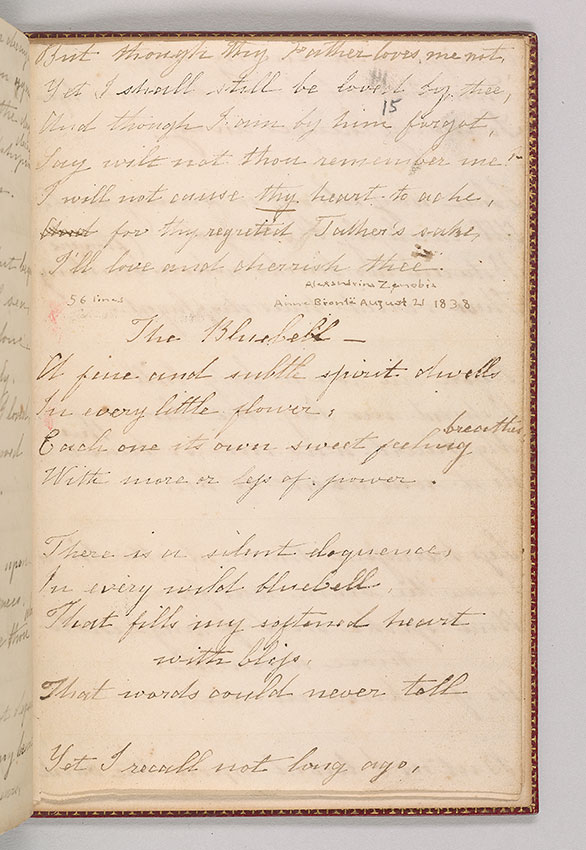
Collection of poems : autograph manuscript signed : [Haworth]
The Henry Houston Bonnell Brontë Collection. Bequest of Helen Safford Bonnell, 1969
“Verses to a Child” (pp. 12–15)
Composed 21 August 1838, when Brontë was eighteen. Written in the voice of Alexandrina Zenobia. First published in Poems (1902), pp. 195–97. Poem 8 in Chitham (1979); pp. 461–63 in Alexander (2010).
“The Bluebell” (pp. 15–18)
Composed 22 August 1840, when Brontë was twenty. First published in Poems (1902), pp. 198–200. Poem 10 in Chitham (1979).
But though thy Father loves me not,
Yet I shall still be loved by thee,
And though I am by him forgot,
Say wilt not thou remember me?
I will not cause thy heart to ache,
And for thy regreted Father’s sake,
I’ll love and cherrish thee.
Alexandrina Zenobia
56 lines Anne Brontë August 21 1838
The Bluebell
A fine and subtle spirit dwells
In every little flower,
Each one its own sweet feeling breathes
With more or less of power.
There is a silent eloquence,
In every wild bluebell,
That fills my softened heart with bliss,
That words could never tell
Yet I recall not long ago,
| Attachment | Size |
|---|---|
| 20.04 MB |
"The Bluebell", p. 16
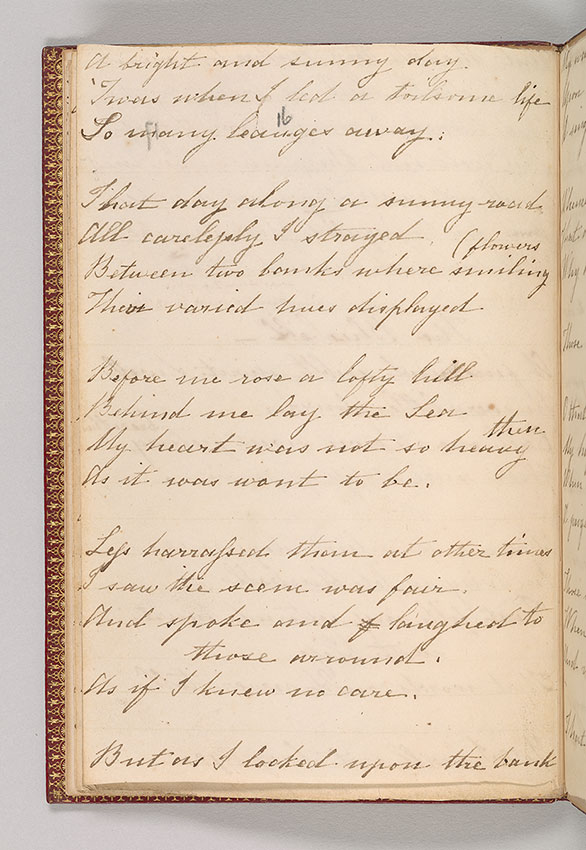
Collection of poems : autograph manuscript signed : [Haworth]
The Henry Houston Bonnell Brontë Collection. Bequest of Helen Safford Bonnell, 1969
“The Bluebell” (pp. 15–18)
Composed 22 August 1840, when Brontë was twenty. First published in Poems (1902), pp. 198–200. Poem 10 in Chitham (1979).
A bright and sunny day
’Twas when I led a toilsome life
So many leauges away;
That day along a sunny road
All carelessly I strayed,
Between two banks where smiling flowers
Their varied hues displayed
Before me rose a lofty hill
Behind me lay the Sea
My heart was not so heavy then
As it was wont to be,
Less harassed than at other times
I saw the scene was fair,
And spoke and f laughed to those around,
As if I knew no care.
But as* I looked upon the bank
*Note: Chitham (1979) transcribes the starred word as “when,” but the manuscript reads “as.”
| Attachment | Size |
|---|---|
| 20.04 MB |
"The Bluebell", p. 17
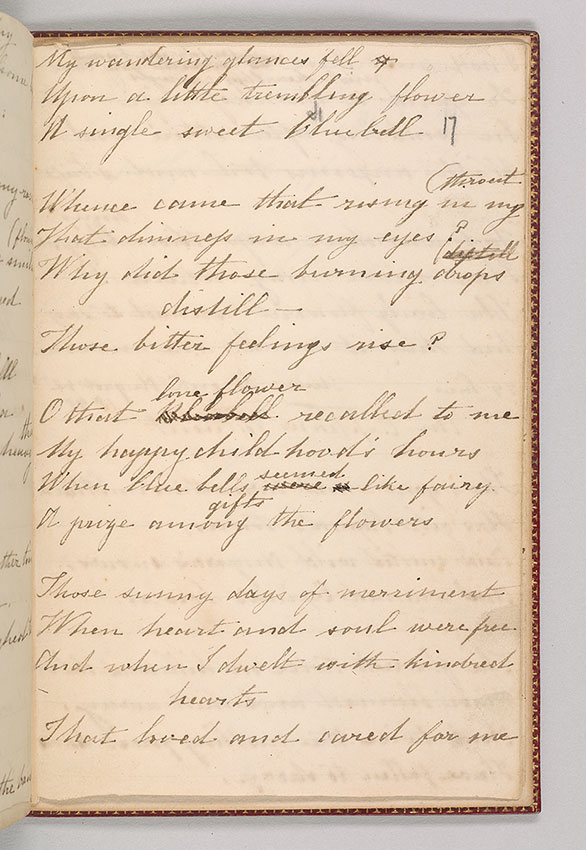
Collection of poems : autograph manuscript signed : [Haworth]
The Henry Houston Bonnell Brontë Collection. Bequest of Helen Safford Bonnell, 1969
“The Bluebell” (pp. 15–18)
Composed 22 August 1840, when Brontë was twenty. First published in Poems (1902), pp. 198–200. Poem 10 in Chitham (1979).
My wandering glances fell
Upon a little trembling flower
A single sweet bluebell.
Whence came that rising in my throat
That dimness in my eyes*?
Why did those burning drops distill –
Those bitter feelings rise?
O that Bluebell lone flower recalled to me
My happy child-hood’s hours
When blue bells were a seemed like fairy gifts
A prize among the flowers
Those sunny days of merriment
When heart and soul were free
And when I dwelt with kindred hearts
That loved and cared for me
*Note: Chitham (1979) transcribes the starred word as “eye,” but the manuscript reads “eyes.”
| Attachment | Size |
|---|---|
| 20.04 MB |
"An Orphan’s Lament", p. 18
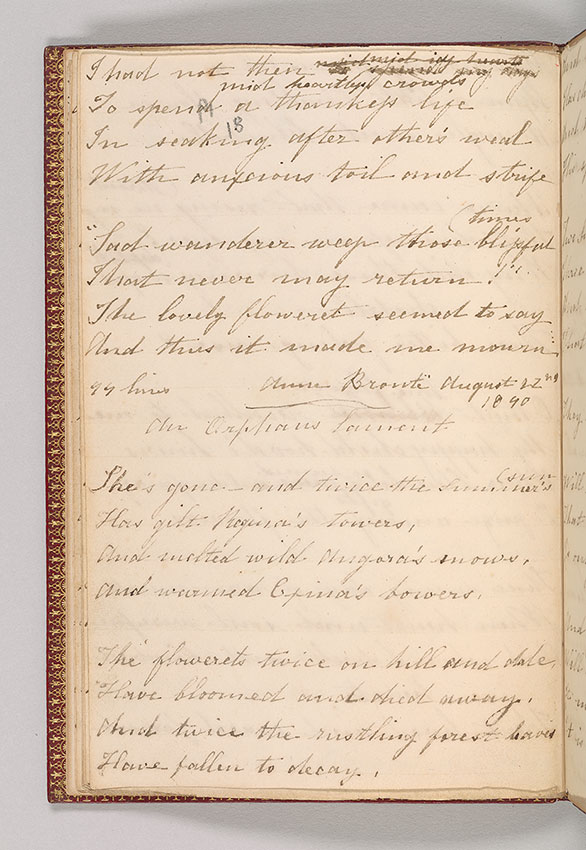
Collection of poems : autograph manuscript signed : [Haworth]
The Henry Houston Bonnell Brontë Collection. Bequest of Helen Safford Bonnell, 1969
“The Bluebell” (pp. 15–18)
Composed 22 August 1840, when Brontë was twenty. First published in Poems (1902), pp. 198–200. Poem 10 in Chitham (1979).
“An Orphan’s Lament” (pp. 18–21)
Composed on New Year’s Day 1841, when Brontë was about to turn twenty-one. First published in Poems (1902), pp. 201–203. Poem 15 in Chitham (1979).
I had not then to spend my days mid mid icy hearts mid heartless crowds
To spend a thank[l]ess life
In seaking after others’ weal
With anxious toil and strife
“Sad wanderer weep those blissful times
That never may return!”
The lovely floweret seemed to say
And thus it made me mourn.
44 lines Anne Brontë August 22nd 1840
––––––––––––
An Orphan[’]s Lament
She’s gone – and twice the summer sun
Has gilt Regina’s towers,
And melted wild Angora’s snows,
And warmed Exina’s bowers,
The flowerets twice on hill and dale,
Have bloomed and died away,
And twice the rustling forest leaves
Have fallen to decay,
| Attachment | Size |
|---|---|
| 20.04 MB |
"An Orphan’s Lament", p. 19
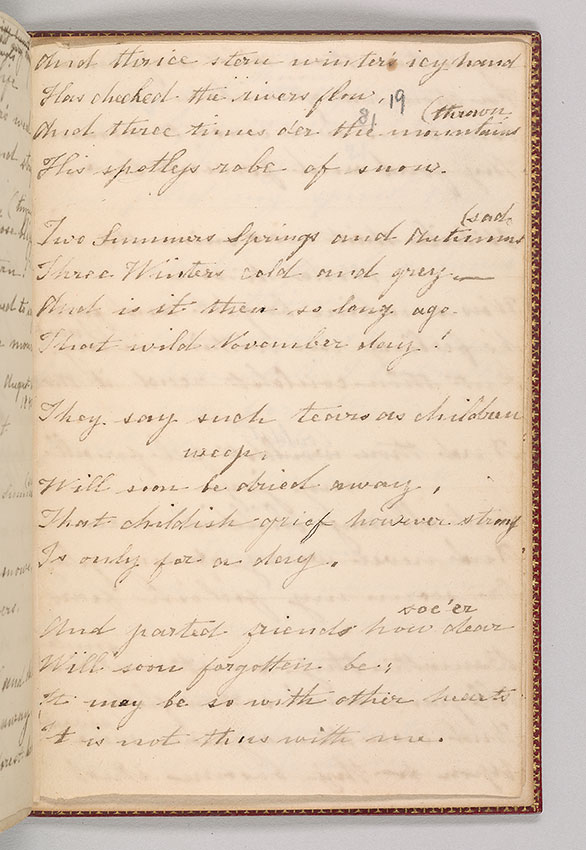
Collection of poems : autograph manuscript signed : [Haworth]
The Henry Houston Bonnell Brontë Collection. Bequest of Helen Safford Bonnell, 1969
“An Orphan’s Lament” (pp. 18–21)
Composed on New Year’s Day 1841, when Brontë was about to turn twenty-one. First published in Poems (1902), pp. 201–203. Poem 15 in Chitham (1979).
And thrice stern winter’s icy hand
Has checked the river[’]s flow,
And three times o’er the mountains thrown
His spotless robe of snow.
Two Summers Springs and Autumns sad
Three Winters cold and gray –
And is it then so long ago,
That wild November day!
They say such tears as children weep,
Will soon be dried away,
That childish grief however strong
Is only for a day.
And parted friends how dear soe’er
Will soon forgotten be;
It may be so with other hearts
It is not thus with me.
| Attachment | Size |
|---|---|
| 20.04 MB |
"An Orphan’s Lament", p. 20
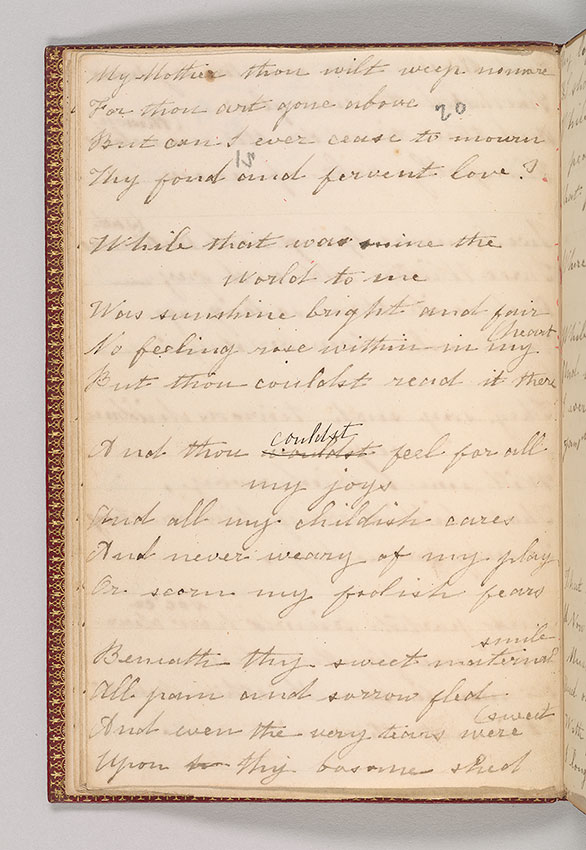
Collection of poems : autograph manuscript signed : [Haworth]
The Henry Houston Bonnell Brontë Collection. Bequest of Helen Safford Bonnell, 1969
“An Orphan’s Lament” (pp. 18–21)
Composed on New Year’s Day 1841, when Brontë was about to turn twenty-one. First published in Poems (1902), pp. 201–203. Poem 15 in Chitham (1979).
My Mother thou wilt weep no more
For thou art gone above
But can I ever cease to mourn
Thy fond* and fervent love?
While that was mine the world to me
Was sunshine bright and fair
No feeling rose within in my heart
But thou couldst read it there
And thou wouldst couldst feel for all my joys
And all my childish cares
And never weary of my play
Or scorn my foolish fears
Beneath thy sweet maternal smile
All pain and sorrow fled
And even the very tears were sweet
Upon [?] thy bosome shed
*Note: Chitham (1979) transcribes the starred word as “good,” but the manuscript reads “fond.”
| Attachment | Size |
|---|---|
| 20.04 MB |
"Lines Written at Thorp Green", p. 21
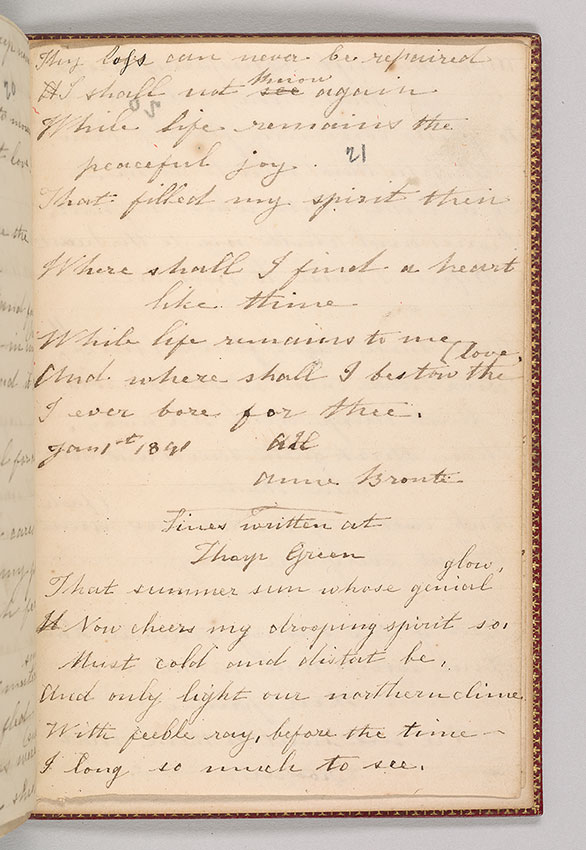
Collection of poems : autograph manuscript signed : [Haworth]
The Henry Houston Bonnell Brontë Collection. Bequest of Helen Safford Bonnell, 1969
“An Orphan’s Lament” (pp. 18–21)
Composed on New Year’s Day 1841, when Brontë was about to turn twenty-one. First published in Poems (1902), pp. 201–203. Poem 15 in Chitham (1979).
“Lines Written at Thorp Green” (pp. 21–23)
Composed 19 August 1841, when Brontë was twenty-one and working as a governess at Thorp Green Hall, near York. First published in Poems (1902), pp. 204–205, with incorrect title “Lines Written at Thays Green.” Poem 16 in Chitham (1979). Note that Brontë wrote another poem with the same title (see Chitham 11).
Thy love loss can never be repaired
A I shall not see know again
While life remains the peaceful joy
That filled my spirit then
Where shall I find a heart like thine
While life remains to me
And where shall I bestow the love
I ever bore for thee.
Jan 1st 1841 AH
Anne Brontë
––––––––––––
Lines written at Thorp Green
That summer sun whose genial glow,
H Now cheers my drooping spirit so,
Must cold and distant be,
And only light our northern clime
With feeble ray, before the time –
I long so much to see.
| Attachment | Size |
|---|---|
| 20.04 MB |
"Lines Written at Thorp Green", p. 22
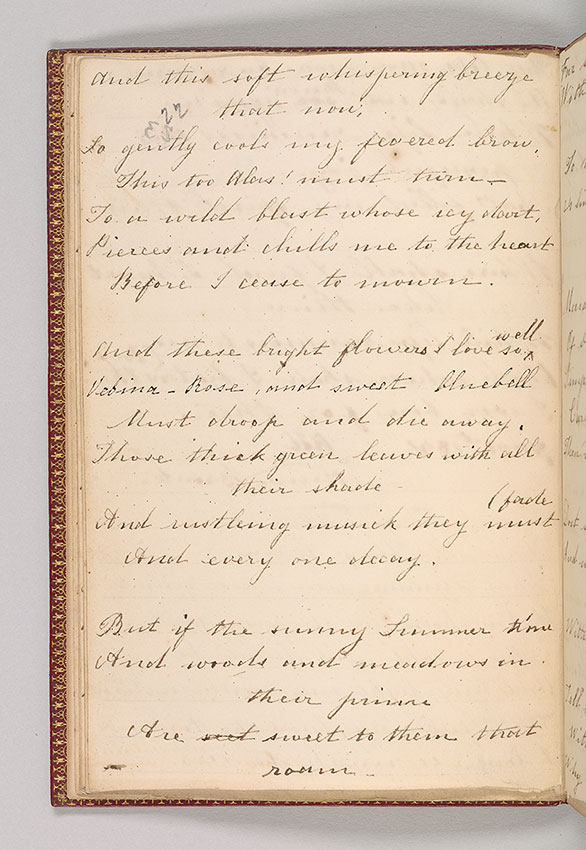
Collection of poems : autograph manuscript signed : [Haworth]
The Henry Houston Bonnell Brontë Collection. Bequest of Helen Safford Bonnell, 1969
“Lines Written at Thorp Green” (pp. 21–23)
Composed 19 August 1841, when Brontë was twenty-one and working as a governess at Thorp Green Hall, near York. First published in Poems (1902), pp. 204–205, with incorrect title “Lines Written at Thays Green.” Poem 16 in Chitham (1979). Note that Brontë wrote another poem with the same title (see Chitham 11).
And this soft whispering breeze that now,
So gently cools my fevered brow,
This too Alas! Must turn –
To a wild blast whose icy dart,
Pierces and chills me to the heart
Before I cease to mourn.
And these bright flowers I love so well
Ve[r]bina – Rose, and sweet bluebell
Must droop and die away,
Those thick green leaves with all their shade
And rustling musick they must fade
And every one decay.
But if the sunny Summer time
And woods and meadows in their prime
Are seet sweet to them that roam –
| Attachment | Size |
|---|---|
| 20.04 MB |
"A Fragment", p. 23
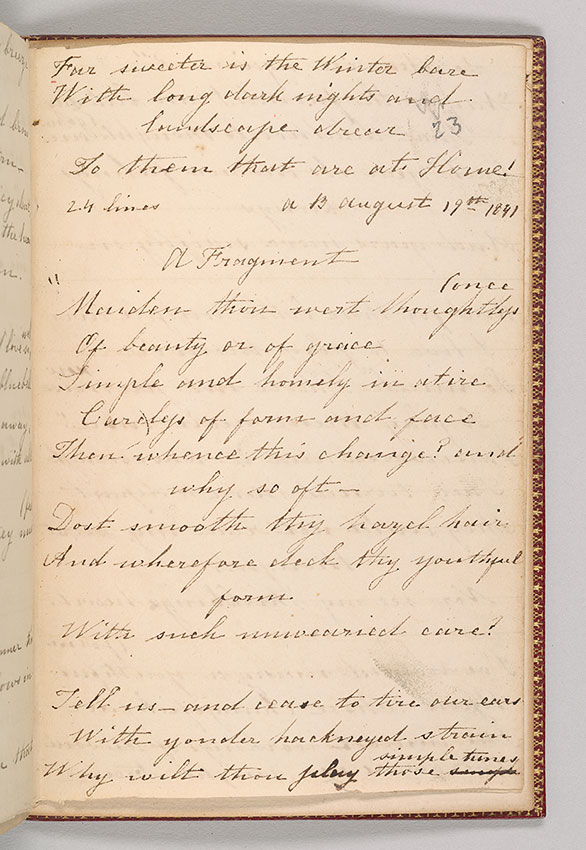
Collection of poems : autograph manuscript signed : [Haworth]
The Henry Houston Bonnell Brontë Collection. Bequest of Helen Safford Bonnell, 1969
“Lines Written at Thorp Green” (pp. 21–23)
Composed 19 August 1841, when Brontë was twenty-one and working as a governess at Thorp Green Hall, near York. First published in Poems (1902), pp. 204–205, with incorrect title “Lines Written at Thays Green.” Poem 16 in Chitham (1979). Note that Brontë wrote another poem with the same title (see Chitham 11).
“A Fragment” (“Self-Congratulation”) (pp. 23–26)
Composed on New Year’s Day 1840, when Brontë was about to turn twenty. This is the only composition in the notebook to be included in the first published book by Charlotte, Emily, and Anne Brontë, Poems by Currer, Ellis, and Acton Bell (London: Aylott & Jones, 1846). Titled “A Fragment” in the manuscript, “Self-Congratulation” in Poems. For publication, Brontë made several revisions, changing the first word from “Maiden” to “Ellen,” for example, removing the Gondal “signature” Olivia Vernon, and revising punctuation. Poem 9 in Chitham (1979); pp. 463–65 in Alexander (2010).
Far sweeter is the Winter bare
With long dark nights and landscape drear
To them that are at Home!
24 lines AB August 19th 1841
A Fragment
“Maiden thou wert thoughtless once
Of beauty or of grace
Simple and homely in atire
Careless of form and face
Then whence this change? And why so oft –
Dost smooth thy hazel hair
And wherefore deck thy youthful form
With such unwearied care?
Tell us – and cease to tire our ears
With yonder hackneyed strain
Why wilt thou play those simple simple tunes
Text as published in Poems (1846)
SELF-CONGRATULATION.
Ellen you were thoughtless once
Of beauty or of grace,
Simple and homely in attire,
Careless of form and face;
Then whence this change? And wherefore now
So often smooth your hair?
And wherefore deck your youthful form
With such unwearied care?
Tell us—and cease to tire our ears
With that familiar strain—
Why will you play those simple tunes
| Attachment | Size |
|---|---|
| 20.04 MB |
"A Fragment", p. 24
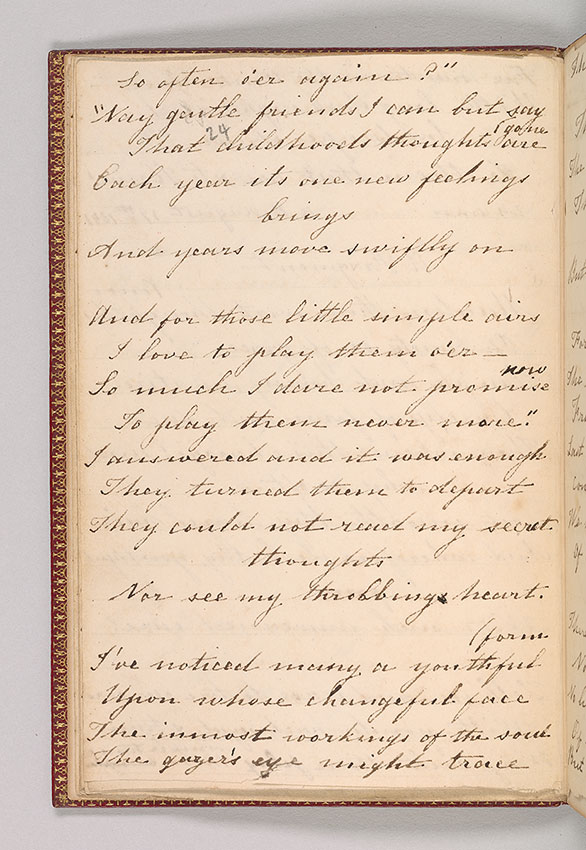
Collection of poems : autograph manuscript signed : [Haworth]
The Henry Houston Bonnell Brontë Collection. Bequest of Helen Safford Bonnell, 1969
“A Fragment” (“Self-Congratulation”) (pp. 23–26)
Composed on New Year’s Day 1840, when Brontë was about to turn twenty. This is the only composition in the notebook to be included in the first published book by Charlotte, Emily, and Anne Brontë, Poems by Currer, Ellis, and Acton Bell (London: Aylott & Jones, 1846). Titled “A Fragment” in the manuscript, “Self-Congratulation” in Poems. For publication, Brontë made several revisions, changing the first word from “Maiden” to “Ellen,” for example, removing the Gondal “signature” Olivia Vernon, and revising punctuation. Poem 9 in Chitham (1979); pp. 463–65 in Alexander (2010).
So often o’er again?
“Nay gentle friends I can but say
That childhood[’]s thoughts are gone
Each year its one new feelings brings
And years move swiftly on
And for those little simple airs
I love to play them o’er –
So much I dare not promise now
To play them never more.”
I answered and it was enough
They turned them [i.e., then] to depart
They could not read my secret thoughts
Nor see my throbbing heart.
I’ve noticed many a youthful form
Upon whose changeful face
The inmost workings of the soul
The gazer’s eye might trace
Text as published in Poems (1846)
So often, o’er again?
“Indeed, dear friends, I can but say
That childhood’s thoughts are gone;
Each year its one new feelings brings,
And years move swiftly on:
“And for these little simple airs—
I love to play them o’er
So much—I dare not promise, now
To play them never more.”
I answered—and it was enough;
They turned them to depart;
They could not read my secret thoughts,
Nor see my throbbing heart.
I’ve noticed many a youthful form,
Upon whose changeful face
The inmost workings of the soul
The gazer well might trace;
| Attachment | Size |
|---|---|
| 20.04 MB |
"A Fragment", p. 25
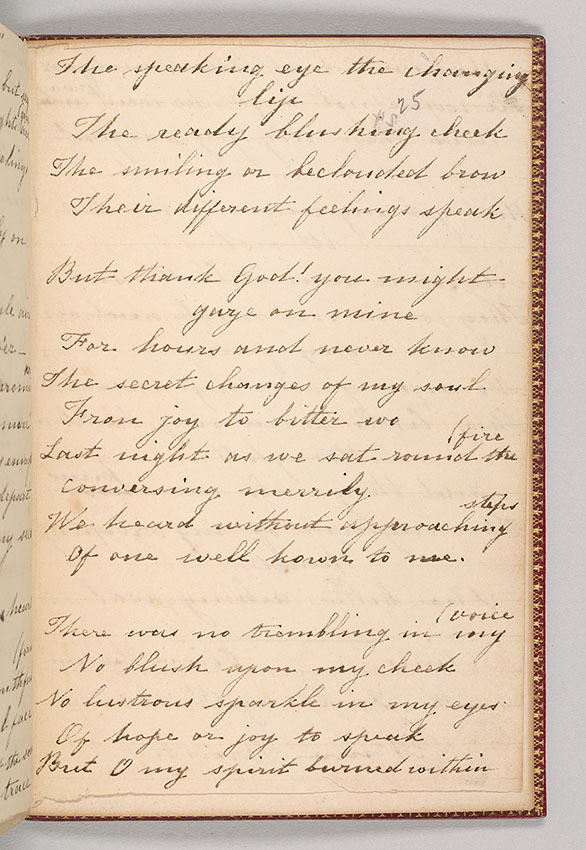
Collection of poems : autograph manuscript signed : [Haworth]
The Henry Houston Bonnell Brontë Collection. Bequest of Helen Safford Bonnell, 1969
“A Fragment” (“Self-Congratulation”) (pp. 23–26)
Composed on New Year’s Day 1840, when Brontë was about to turn twenty. This is the only composition in the notebook to be included in the first published book by Charlotte, Emily, and Anne Brontë, Poems by Currer, Ellis, and Acton Bell (London: Aylott & Jones, 1846). Titled “A Fragment” in the manuscript, “Self-Congratulation” in Poems. For publication, Brontë made several revisions, changing the first word from “Maiden” to “Ellen,” for example, removing the Gondal “signature” Olivia Vernon, and revising punctuation. Poem 9 in Chitham (1979); pp. 463–65 in Alexander (2010).
The speaking eye the changing lip
The ready blushing cheek
The smiling or beclouded brow
Their different feelings speak
But thank God! You might gaze on mine
For hours and never know
The secret changes of my soul
From joy to bitter wo
Last night as we sat round the fire
Conversing merrily
We heard without approaching steps
Of one well known to me.
There was no trembling in my voice
No blush upon my cheek
No lustrous sparkle in my eyes
Of hope or joy to speak
But O my spirit burned within
Text as published in Poems (1846)
The speaking eye, the changing lip,
The ready blushing cheek,
The smiling, or beclouded brow,
Their different feelings speak.
But, thank God! You might gaze on mine
For hours, and never know
The secret changes of my soul
From joy to keenest woe.
Last night, as we sat round the fire
Conversing merrily,
We heard, without, approaching steps
Of one well known to me!
There was no trembling in my voice
No blush upon my cheek,
No lustrous sparkle in my eyes,
Of hope, or joy, to speak;
But, oh! My spirit burned within,
| Attachment | Size |
|---|---|
| 20.04 MB |
"A Fragment", p. 26
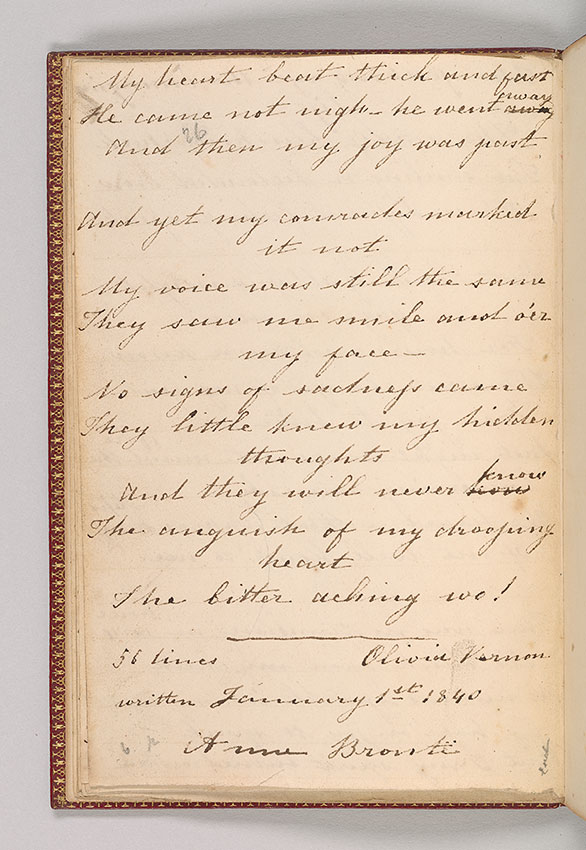
Collection of poems : autograph manuscript signed : [Haworth]
The Henry Houston Bonnell Brontë Collection. Bequest of Helen Safford Bonnell, 1969
“A Fragment” (“Self-Congratulation”) (pp. 23–26)
Composed on New Year’s Day 1840, when Brontë was about to turn twenty. This is the only composition in the notebook to be included in the first published book by Charlotte, Emily, and Anne Brontë, Poems by Currer, Ellis, and Acton Bell (London: Aylott & Jones, 1846). Titled “A Fragment” in the manuscript, “Self-Congratulation” in Poems. For publication, Brontë made several revisions, changing the first word from “Maiden” to “Ellen,” for example, removing the Gondal “signature” Olivia Vernon, and revising punctuation. Poem 9 in Chitham (1979); pp. 463–65 in Alexander (2010).
My heart beat thick and fast
He came not nigh – he went away away
And then my joy was past
And yet my comrades marked it not
My voice was still the same
They saw me smile and o’er my face –
No signs of sadness came
They little knew my hidden thoughts
And they will never now know
The anguish of my drooping heart
The bitter aching wo!
––––––––––––
56 lines Olivia Vernon
written January 1st 1840
Anne Brontë
Text as published in Poems (1846)
My heart beat full and fast!
He came not nigh—he went away—
And then my joy was past.
And yet my comrades marked it not:
My voice was still the same;
They saw me smile, and o’er my face
No signs of sadness came.
They little knew my hidden thoughts;
And they will never know
The aching anguish of my heart,
The bitter burning woe!
| Attachment | Size |
|---|---|
| 20.04 MB |